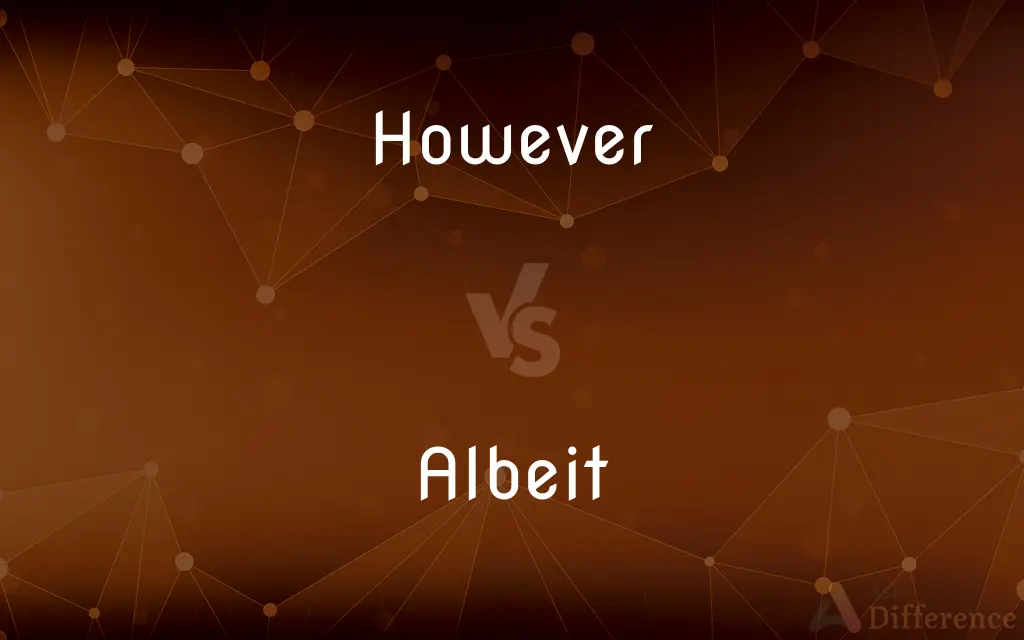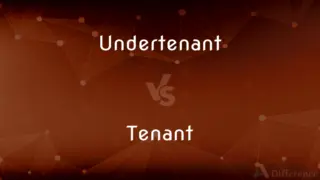However vs. Albeit — What's the Difference?
By Tayyaba Rehman & Urooj Arif — Published on August 12, 2024
"However" is used to introduce a contrasting statement, while "albeit" introduces a concession or limitation within an ongoing context.

Difference Between However and Albeit
Table of Contents
ADVERTISEMENT
Key Differences
"However" is a conjunction or adverb used to introduce a contrast or opposition to what has just been mentioned, signaling a shift in the discussion. It is commonly used at the beginning of a sentence or clause to contrast with a previous statement. On the other hand, "albeit" is a conjunction that means "although" or "even though," used to introduce a concessive statement, acknowledging a fact or idea that diminishes the strength or changes the impact of the statement it follows.
While "however" often serves to introduce a completely different or opposing idea, "albeit" is used to soften a statement or introduce a limitation that does not entirely negate the previous statement but adds a nuanced condition. "However" is more versatile in sentence placement and can appear at the beginning, middle, or end of a sentence, whereas "albeit" usually integrates more directly into the flow of the sentence, linking closely to the specific idea it modifies.
The use of "however" is common in both formal and informal writing, making it a staple in academic, professional, and casual discourse. It is a crucial tool for constructing logical arguments, debates, and discussions where contrasting ideas are presented. Conversely, "albeit" tends to appear more in formal writing or literary contexts, providing a nuanced way to acknowledge exceptions or limitations without undermining the main argument or point.
"However" can be used to introduce a range of contrasts, from mild differences of opinion to stark oppositions, and is often followed by a comma when used to start a sentence. In contrast, "albeit" introduces a concessive clause, which is part of the sentence that it modifies, and does not typically stand alone or start a new sentence. This makes "albeit" more embedded in the sentence structure, providing a smooth transition to the concession it introduces.
The choice between "however" and "albeit" depends on the writer's intent: if the goal is to introduce a clear contrast or opposition, "however" is appropriate. If the aim is to acknowledge a limitation or exception that tempers but does not entirely counter the preceding claim, "albeit" is the better choice. Both serve to enrich the text by allowing for complexity and nuance in presenting ideas and arguments.
ADVERTISEMENT
Comparison Chart
Meaning
Used to introduce a contrasting statement.
Used to introduce a concession or limitation.
Function
Introduces contrast or opposition.
Softens or qualifies a statement.
Usage
Can be used at the beginning, middle, or end.
Integrates into the sentence it modifies.
Context
Common in formal and informal writing.
More common in formal or literary contexts.
Sentence Example
"He wanted to buy the car; however, he didn't have enough money."
"It was a welcome change, albeit a small one."
Compare with Definitions
However
Introduces a contrasting statement or idea.
She planned to attend the meeting; however, she fell ill.
Albeit
Softens or qualifies the preceding statement.
It's a small step, albeit in the right direction.
However
Can be placed variously within a sentence.
However difficult the task may seem, we must try.
Albeit
Introduces a concession within an ongoing context.
The victory was sweet, albeit hard-earned.
However
Broadly used in both formal and informal settings.
I’d like to help; however, I’m committed elsewhere.
Albeit
Part of the sentence it modifies, without starting a new one.
She accepted the job, albeit with some hesitation.
However
Often followed by a comma when starting a sentence.
However, it's important to note the exceptions.
Albeit
Introduces nuanced conditions or limitations.
He agreed to the terms, albeit reluctantly.
However
Can introduce a wide range of contrasts.
He enjoys classical music; however, he also has a taste for jazz.
Albeit
Commonly found in more formal or literary writing.
The novel was well-received, albeit not a bestseller.
However
In spite of that; nevertheless; yet
The book is expensive.
However, it's worth it.
Albeit
Even though; although; notwithstanding
Clear albeit cold weather.
However
To whatever degree or extent
"The prospect of success, however remote, was tantalizing" (Stephen Baker).
Albeit
Although, despite (it) being.
However
(conjunctive) In contrast.
The conference itself went very well. The party afterwards, however, was a disaster.
Albeit
Even though; although; notwithstanding.
Albeit so masked, Madam, I love the truth.
However
Regardless of the way in which.
Let me know when you've had your interview, however it goes.
However we do this, it isn't going to work.
However
At all events; at least; in any case.
Our chief end is to be freed from all, if it may be, however from the greatest evils.
However
Nevertheless; notwithstanding; yet; still; though; as, I shall not oppose your design; I can not, however, approve of it.
In your excuse your love does little say;You might howe'er have took a better way.
However
By contrast; on the other hand;
The first part was easy; the second, however, took hours
However
In what way or manner or by what means (`however' is sometimes used as an intensive form of `how');
How did you catch the snake?
He told us how he did it
However did you get here so soon?
Common Curiosities
How does "however" affect the structure of a sentence?
"However" can alter the flow of a sentence by introducing a pause or break, often requiring a comma when used at the beginning.
Is "albeit" more formal than "however"?
Yes, "albeit" tends to be more formal and is often used in literary or sophisticated contexts.
Can "however" and "albeit" be used interchangeably?
No, because they serve different functions in a sentence: "however" for contrast and "albeit" for concession.
Can "albeit" start a sentence?
Typically, "albeit" does not start a sentence; it is used within a sentence to introduce a concessive clause.
What is the main difference between "however" and "albeit"?
"However" introduces a contrasting statement, while "albeit" introduces a concession or limitation.
Is "however" suitable for academic writing?
Yes, "however" is widely used in academic writing to introduce contrasts or alternative viewpoints.
Why might a writer choose "albeit" over "however"?
A writer might choose "albeit" to subtly introduce a limitation or softening condition without strongly contrasting the main statement.
Can "albeit" be used in informal conversation?
While less common in informal speech, "albeit" can be used to sound more sophisticated or thoughtful.
How do "however" and "albeit" contribute to the clarity of writing?
Both contribute to clarity by allowing writers to introduce complexity, contrast, or nuance in their arguments or descriptions.
What is a good strategy for deciding whether to use "however" or "albeit"?
Consider whether you're introducing a contrast (use "however") or acknowledging a limitation within the same idea (use "albeit").
Share Your Discovery

Previous Comparison
Checkbox vs. Tickbox
Next Comparison
Undertenant vs. TenantAuthor Spotlight
Written by
Tayyaba RehmanTayyaba Rehman is a distinguished writer, currently serving as a primary contributor to askdifference.com. As a researcher in semantics and etymology, Tayyaba's passion for the complexity of languages and their distinctions has found a perfect home on the platform. Tayyaba delves into the intricacies of language, distinguishing between commonly confused words and phrases, thereby providing clarity for readers worldwide.
Co-written by
Urooj ArifUrooj is a skilled content writer at Ask Difference, known for her exceptional ability to simplify complex topics into engaging and informative content. With a passion for research and a flair for clear, concise writing, she consistently delivers articles that resonate with our diverse audience.













































